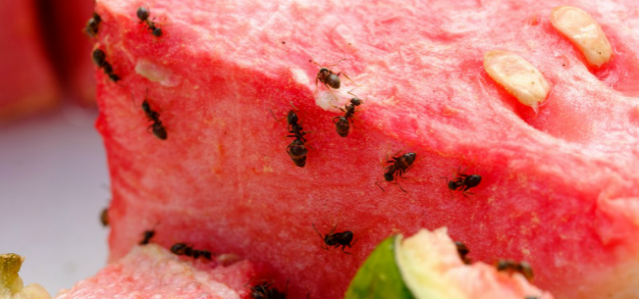9 Tips for Keeping Ants Out Of Your Kitchen This Summer

For New Englanders, summertime is really all about the food - whether it’s barbecues in the backyard, fresh fruits and veggies for weeknight dinners, or snacks around the firepit with a sunset in the background. Unfortunately, the warm weather is also prime time for ants, and an infestation of these invaders can ruin just about any picnic before the basket is even packed.
Whether you’re a dedicated summer diner or a casual warm-weather snack lover, the spring and summer are prime time for ants to make their way into your kitchen and set about stealing, eating, or otherwise infecting all of your favorite foods.
Luckily, there are ways to keep ants from every finding their way inside in the first place, and to get rid of them effectively if they do make those first forays into your eating space.
1. Keep food crumbs to a minimum
It may seem obvious, but one of the primary temptations for ants looking to settle into your kitchen is the availability of food left for the taking. Remember, ants will seek out just about anything they can bring back to the colony: crumbs of bread, bits of fruit, and even grains of salt. Plus, they’ll let other colony members know where they found it, and how to get back there to get more.
The solution is simple: keep your cooking and eating space cleaned and clear of food crumbs and ants will have less reason to stick around.
2. Don’t allow standing water to pool or sit undisturbed
While food may be a major motivator for ant explorers looking to extend their supply lines, access to water is also a critical part of any colony’s survival. Even a small puddle or pool of water can quench an ant’s thirst for quite a while - and the more reliable the water source, the closer the colony will want to keep to your kitchen.
Be sure to clean up all water spills quickly and completely, and check common high-moisture areas regularly - underneath sinks, around refrigerators, by windows and doors, etc. - to be sure there’s no oasis waiting for these pesky invaders.
3. Keep all pantry items securely sealed and out of reach from the ground
Few feelings make a homeowner more uncomfortable than reaching into a bag of flour or a sack of snacks and finding ants busy chomping away. Not only will this mean a lot of wasted food, but also that ants have found a stable central point to explore from in your pantry.
For that reason, homeowners should be sure all pantry items that might otherwise be attractive to ants should be securely sealed when not in use, and stored in an area not easily accessible by ants. Pantry shelves and wire racks can go a long way in helping to prevent ants from reaching your most useful ingredients.
4. Ensure all windows and exterior doors are securely sealed when shut
Like many natural forces, ants follow the same basic rules of movement - namely, that they’re most likely to follow the path of least resistance in their search for food. That means that open windows and doors, even those with small openings or cracks, can offer a prime entrance point for a line of ants on its way to come and wreck your kitchen.
Inspect your doors and windows carefully for openings or possible entrance points, and be sure to close up any gaps before ants get a chance to make their way inside.
5. Check all screens for rips or tears
When the weather is warm and heat is building up indoors, a homeowner’s first reaction might be to throw open the windows and let the fresh air flow in through the screens. But if those screens feature even the tiniest rips or damage, they may very well end up being simply an easy way for ants to begin their invasion.
It’s always a good idea to check your screens for damage at the start of the summer, and to make sure all are in good condition before those hot afternoons really hit.
6. Thoroughly clean countertops after food prep with vinegar or other cleaning agent
Ants are naturally attracted to sugar - that’s why so many picnics lose their watermelons to lines of ants looking for a quick snack. The same is also true, however, for your kitchen counters. Whether you’re chopping fruit or making dessert, that sticky, sugary buildup left over after cooking can offer an easy source of energy for ants on the hunt for food.
For homeowners who love to cook throughout the summer, it’s always a good idea to thoroughly clean and wipe down your cooking and preparation surfaces with an effective cleaning agent, or with a natural solution like vinegar. This will remove that sticky residue and remove the temptation for ants to settle in on your countertops.
7. Follow ant trails to determine the source of the infestation
You may have noticed ants following one consistent trail into your kitchen, usually determined by an invisible pheromone trail left by the original explorer ant to guide the colony to the food source. While frustrating, this single line of ants can also help you trace the infestation back to its source - typically, a nesting spot in a warm and secluded place, likely just outdoors from your kitchen.
Once you’ve identified the path ants take into your kitchen, follow the line backwards until you figure out exactly where they may be originating - then, you can take tactical action to stop the flow and take out the colony.
8. Consider utilizing bait traps to eliminate the entire colony & the queen
Time-tested and often highly effective at battling small ant infestations, bait traps and liquid bait can offer a big advantage in taking down colonies right at their source. Ants will detect the available bait trap, ingest a small portion, and then carry the substance back to the colony.
In just a short while, this will reach the queen and, upon her death, the colony will begin to collapse - possibly ending your ant problem right down to the core.
9. Contact an ant control professional to identify and stop the spread of ants
For particularly large, invasive, difficult, or dangerous ant infestations, the best solution for a homeowner may be to contact an experienced pest professional with expert knowledge in ant elimination.
Professional ant removal experts will also treat your ant problem directly at the source - the nest - and provide follow-up inspections to ensure the infestation is completely neutralized.
Don’t Let Ants Take Over Your Kitchen - Fight Back
Regardless of how many ants you may be facing, what kind you may notice, or how consistently they may appear, even a single ant in your kitchen is something to worry about - because, as the old saying goes: “If there’s one, there's probably a hundred.”
Don’t wait and don’t hesitate - take action and keep your kitchen ant free, so you can enjoy your summer to the fullest.



